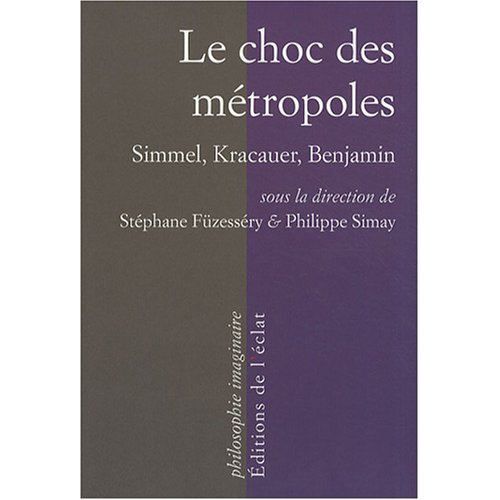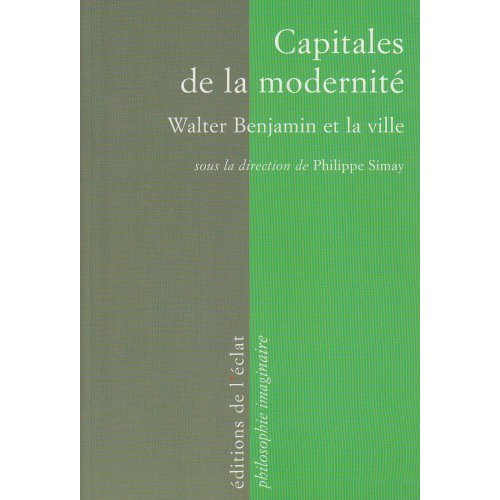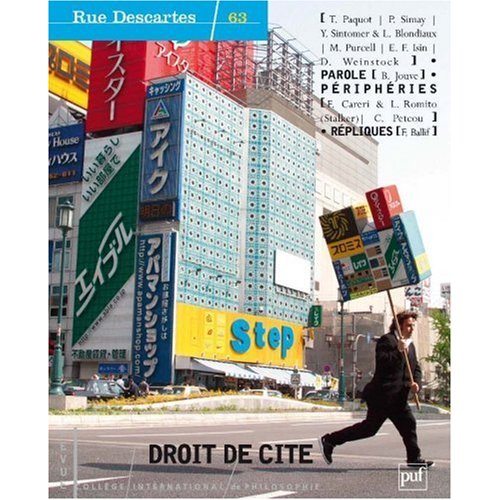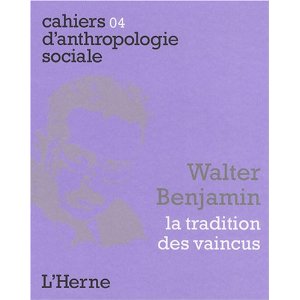BOOKS

Le choc des métropoles
(Edited with S. Füzesséry) Paris, Editions de l’Eclat, 2008
What was the common experience of the large city in Europe at the start of the 20th Century? How did people react in Berlin or Paris faced with the accumulation of people, the mobility of the masses, the acceleration and intensification of circulations, the increasing importance of new iron, glass and bitumen surfaces? Three authors – George Simmel, Siegfried Kracauer and Walter Benjamin – were the visionaries whose writing presaged what was to become the ‘shock of the metropolis’ in reference to a population that had become a large, indistinguishable crowd. Presented here, their works provide an accessible route to understanding modern sensitivity.
Contributors: S. Jonas, Th. Paquot, D. Frisby, O. Agard, N. Périvolaropoulou, C. Krebs, M. Sagnol, P-D. Huyghe, M. Girard, M. Cacciari.

Capitales de la modernité : Walter Benjamin et la ville
Paris, Editions de l’Eclat, 2005
The urban issues considered in the ideas of Walter Benjamin occur in a space ‘between two cities’ where a form of contradictory modernity developed: Paris, capital of the 19th Century and Berlin, site of the 20th Century. In response to the question ‘How does one inhabit the modern?’ Benjamin answered with an astonishing architectural philosophy, in which exiles and childhood memories, dawdling and revolutionary practices, transparency and opacity, cinema and social expertise all mix. The volume attempts to contribute to this inventory, considering the city as a ‘centre of gravity’ of the Benjaminian idea, on which other forms of linguistic, esthetical and political architecture converge.
Contributors: M. Löwy, R. Robin, G. Petitdemange, G. Gilloch, A. Benjamin, C. Rice, W. Bock.
 Droit de cité
Droit de cité
Revue Rue Descartes, Paris, Presses Universitaires de France, 2009
40 years ago the philosopher Henri Lefebvre first formulated the idea of the ‘right to the city’. He demanded, for all urbanites, not only the right to access and appropriate all public spaces, but also to participate and transform the city according to the needs and desires of each person. If, in 1968, such an idea still originated from a political utopian ideal, it was by this time an ideal that was largely shared. Today ordinary people demand the right to make the city, to participate in the decision-making and transformation processes of the spaces in which they live. This issue of Rue Descartes discusses the current state of citizenship rights in posing the question of how they are susceptible to reclassifying the identity of urban-dweller and to operating a new democratic inclusion.
Contributors: Y. Sintomer, L. Blondiaux, Th. Pacquot, M. Purcell, E. F. Isin, D. Weinstock, B. Jouve, F. Careri, L. Romito, C. Petcou, F. Ballif.

Walter Benjamin. La tradition des vaincus
Cahiers d’anthropologie sociale, Éditions de l’Herne, 2008
The work of Walter Benjamin today receives a response that goes beyond literary critique to invest in different fields of knowledge. It is but rarely however that ethnologists, historians and sociologists truly make reference to him and his work. The marginal place that Benjamin occupies within the social and human sciences is all the more troubling given that his analyses on the development of mass culture, the transformation of communication regimes and the critique of historic progress are situated at the crossroads of these disciplines. This volume is a first attempt to focus attention on the singularity of Benjaminian ideas and compare contributions arising from the social sciences. They show how Benjamin’s concepts have retained their power of critique, shaking the lines of knowledge, sharing and renewing our disciplinary practices.
Contributors M. Abélès, A. Farge, C. Jouhaud, M. Leclerc-Olive, M. Löwy, M. Riot-Sarcey.
Peer-reviewed papers
« Kafka et l’écriture de la transmission », Archives de philosophie, tome 62, 1999.
« Le crépuscule de la tradition », Critique, n° 659, avril 2002. Télécharger le document
« Une autre ville pour une autre vie. Henri Lefebvre et les situationnistes », Métropoles, février 2009. Télécharger le document
Chapter or other part of a book
« Walter Benjamin. La ville comme expérience »in Le territoire des philosophes(sous la dir. de C. Younès et Th. Paquot), Paris, La Découverte, 2009.
« Le temps des traditions. Anthropologie et historicité » in Historicité(s)(sous la dir. de C. Delacroix, F. Dosse et P. Garcia), Paris, La Découverte, 2009.
« La tradition est-elle une réalité ? » in Grand dictionnaire de la philosophie, Paris, Larousse/CNRS, 2003.
« Tradition as Injonction : Walter Benjamin and the Critics of Historicism » in Walter Benjamin and History ( Edited by Andrew Benjamin,), New-York, CIPG-Mansell, 2005. Download the file
« Fêtes urbaines » et « Prostitution » in La ville au cinéma(sous la direction de Th. Paquot), Paris, Éditions des Cahiers du cinéma, 2006.
Interviews
Ce que montrent les images. Interview with the anthropologist Philippe Descola, La vie des idées. 30 août 2010.
Actualité des utopies urbaines. Interview with the architects Djamel Klouche and Pascal Cribier, Cité, n°42, 2010, PUF.
La ville sensuelle. Interview with the architect Jacques Ferrier, La vie des idées. 1er décembre 2009.
L’économie du Grand Paris. Interview with the economist Michael Storper, La vie des idées. 18 février 2009.
Interview with the architect David Mangin, La vie des idées. 19 mai 2009.
Books reviewed
Enquête, « Naturalisme versus constructivisme », sous la dir. de M. de Fornel et C. Lemieux, Paris, Editions de l’EHESS. In La vie des idées, novembre 2008.
La passion de l’art primitif. Une ethnologie des collectionneursde B. Derlon et M. Jeudy-Ballini, Paris, Gallimard. In La vie des idées, septembre 2008.
Penser, dessiner, construire. Wittgenstein et l’architecture, sous la dir. de Céline Poisson, Paris, Éditions de l’Éclat. In Urbanisme, n° 358, janvier 2008.
Habiter, le propre de l’humainsous la dir. de C. Younès, Th. Paquot et M. Lussault, Paris, La Découverte, 2007. In Urbanisme n° 358, janvier 2008.
L’imaginaire d’Internet de P. Flichy, Paris, La Découverte, 2001. In Flux, n° 47, janvier-mars 2002.